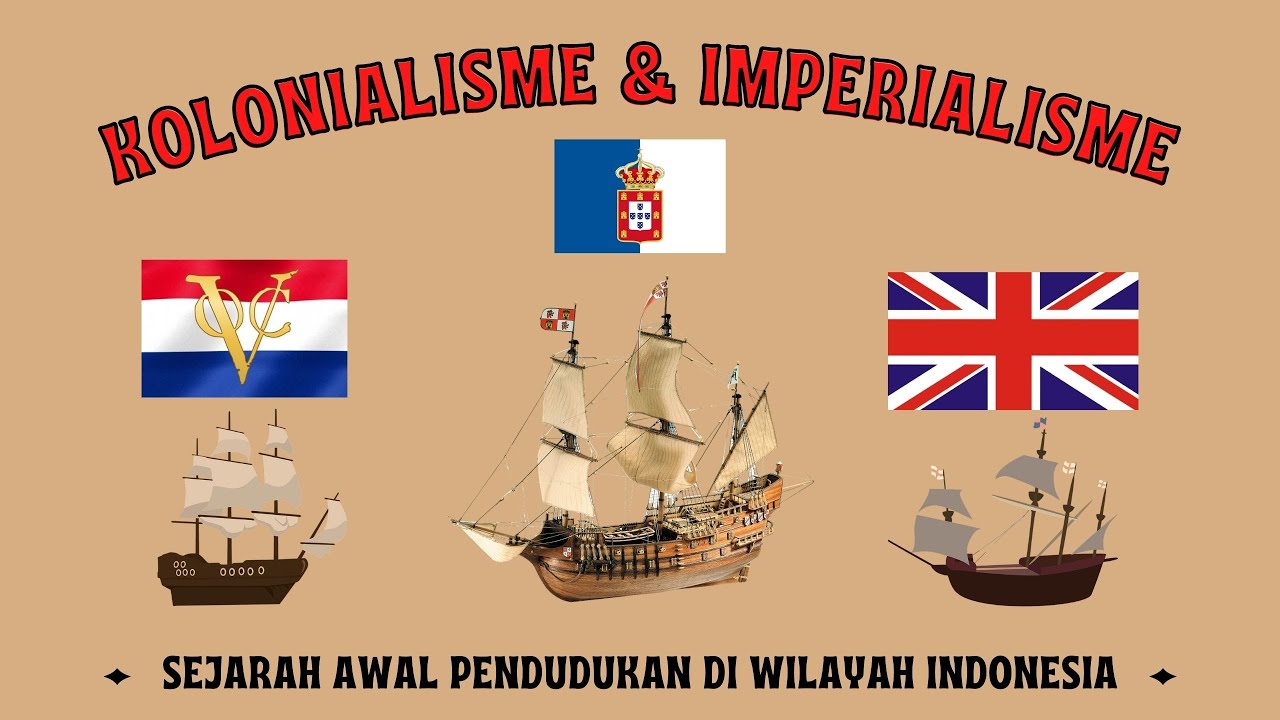Penjajahan Belanda Abad 19 | Perjuangan Indonesia Vs Penjajah | IPS | Kelas 5 SD | SayaBisa
Summary
TLDRThis video explores the history of Dutch colonialism in Indonesia, starting from the 16th century with the bankruptcy of the VOC, leading to French influence under Napoleon. It discusses the brutal policies of Governor-General Herman Willem Daendels, who forced Indonesians into labor to build the long Java Road. Later, Governor Johannes van den Bosch enforced the Cultuurstelsel, forcing Indonesians to grow export crops like coffee and tobacco for minimal pay. Despite resistance from figures like Edward Douwes Dekker, the system continued until its eventual decline. The video highlights the hardships faced by the Indonesian people under colonial rule.
Takeaways
- 😀 The Dutch colonization ended in the 16th century due to the bankruptcy of the VOC (Dutch East India Company).
- 😀 The colonization continued into the 19th century after Napoleon Bonaparte defeated the Dutch, leading to the appointment of Herman Willem Daendels as Governor-General of Indonesia.
- 😀 Daendels was tasked with preparing for potential English attacks by strengthening defenses on Java, including the construction of a long highway from Anyer to Panarukan.
- 😀 The construction of the highway was carried out using forced labor (known as 'kerja rodi'), with Indonesians suffering from hunger, disease, and harsh punishments for disobedience.
- 😀 In 1811, Daendels was recalled to the Netherlands due to his cruelty, and was replaced by Janssens, but Dutch colonial rule persisted.
- 😀 In 1830, Johannes van den Bosch was appointed as Governor-General and imposed the Cultuurstelsel (Forced Cultivation System) to replenish the Netherlands' depleted treasury.
- 😀 The Cultuurstelsel required Indonesians to dedicate a fifth of their land to cultivating crops like tea, coffee, tobacco, and sugar, which were profitable in Europe.
- 😀 Under the Cultuurstelsel, farmers were required to produce crops for the Dutch government without sufficient compensation, leading to widespread exploitation and starvation.
- 😀 Despite the official rules, the implementation of the Cultuurstelsel was often abused, with the Dutch extracting crops at very low prices and causing severe hardship for the Indonesian people.
- 😀 Some Dutch individuals, like Edward Douwes Dekker (who wrote under the pen name Multatuli), opposed the system, with Dekker writing the book 'Max Havelaar' to expose the suffering of Indonesians.
- 😀 After years of public and political pressure, the Cultuurstelsel was gradually phased out in the Netherlands, but it left a legacy of exploitation and resistance among the Indonesian population.
Q & A
What triggered the end of Dutch colonization in the 16th century?
-The Dutch colonization ended in the 16th century due to the bankruptcy of the Dutch East India Company (VOC).
How did Napoleon Bonaparte influence Dutch colonial rule in Indonesia?
-Napoleon Bonaparte defeated the Dutch and took control of their territories, leading to the appointment of Herman Willem Daendels as the Governor-General of the Netherlands Indies in the early 19th century.
What was the purpose of the long road built by Daendels in Java?
-The purpose of the road, stretching from Anyer in Banten to Panarukan in East Java, was to facilitate the movement of Dutch military forces in case of war with Britain.
What was the system of forced labor implemented by Daendels, and how did it affect the Indonesian people?
-Daendels implemented forced labor or 'kerja rodi,' where Indonesians were required to work on the construction of the road without pay. Those who resisted faced severe punishment, leading to widespread suffering, death from starvation, and malaria among the workers.
What happened to Herman Willem Daendels after his actions in Indonesia?
-After his brutal actions were reported, Napoleon called Daendels back to the Netherlands in 1811 and replaced him with Janssens.
Who was Governor-General Van den Bosch, and what was his role in Indonesia?
-Governor-General Van den Bosch was appointed in 1830 and tasked with replenishing the Dutch treasury, which had been depleted due to war. He implemented the 'Cultuurstelsel' (forced cultivation system) that required Indonesians to grow cash crops like coffee, tea, and tobacco.
What was the 'Cultuurstelsel' (forced cultivation system), and how did it impact Indonesian farmers?
-The Cultuurstelsel required Indonesian farmers to dedicate one-fifth of their land to cash crops, which were then handed over to the Dutch government. This system placed a heavy burden on farmers, who suffered from harsh conditions, unfair prices, and the loss of their land for food crops.
How did the Cultuurstelsel benefit the Dutch government?
-The Cultuurstelsel allowed the Dutch government to collect crops at low prices, which helped fill their empty treasury. The forced system provided substantial profits for the Netherlands, while the Indonesian population continued to suffer.
Who was Edward Douwes Dekker, and what did he do to challenge the Cultuurstelsel?
-Edward Douwes Dekker, writing under the pseudonym Multatuli, opposed the forced cultivation system. He wrote the book 'Max Havelaar,' which highlighted the suffering of Indonesians under the system and advocated for its abolition.
How did the Dutch government respond to the criticism of the Cultuurstelsel?
-After much debate in the Dutch parliament, the Cultuurstelsel was gradually abolished, but the Indonesian people continued to resist colonial rule in various regions.
Outlines

This section is available to paid users only. Please upgrade to access this part.
Upgrade NowMindmap

This section is available to paid users only. Please upgrade to access this part.
Upgrade NowKeywords

This section is available to paid users only. Please upgrade to access this part.
Upgrade NowHighlights

This section is available to paid users only. Please upgrade to access this part.
Upgrade NowTranscripts

This section is available to paid users only. Please upgrade to access this part.
Upgrade NowBrowse More Related Video

Sejarah Penjajahan Pemerintahan Belanda Pasca Bubarnya VOC

Kisah Penjajahan Belanda di Indonesia Pada Abad 16 | IPS | SayaBisa

SEJARAH PENJAJAHAN PRANCIS DI NUSANTARA

SEJARAH KOLONIALISME & IMPERIALISME DI INDONESIA

Bagaimana bisa Prancis dan Inggris menduduki Nusantara?

SEJARAH KOLONIALISME & IMPERIALISME DI INDONESIA
5.0 / 5 (0 votes)